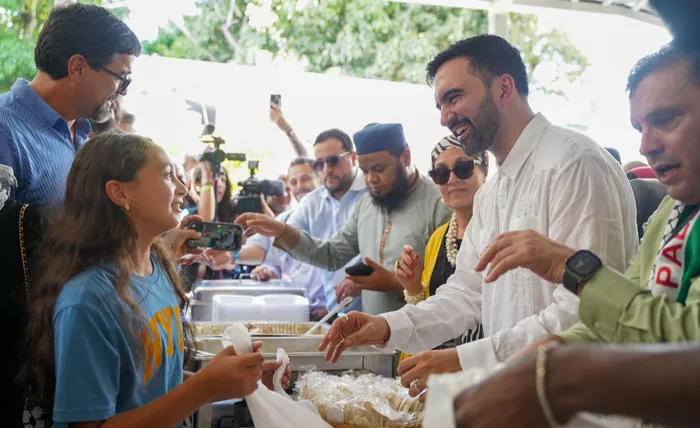Beyond fear politics: what SA can learn from Mamdani's New York victory
Fear and division

New York City Mayor elect Zohran Mamdani helps handing out lunch after he joined members of the Centro Islamico del Caribe-Masjid Ebadur Rahman mosque in prayer in San Juan, Puerto Rico.
Image: Picture: Angel Valentin/Getty Images/AFP
THE story of New York's new mayor, Zohran Kwame Mamdani, starts not in America but in Cape Town.
His childhood in South Africa during the end of apartheid gave him a first-hand look at inequality.
This experience, he said, taught him that justice must be real and tangible, not just an idea.
This lesson is now facing a backlash from powerful figures like Donald Trump and Elon Musk. Their opposition isn't just personal. It's a rejection of the very idea of material justice that Mamdani learned in South Africa.
For some on the South African left, Mamdani’s win is a cause for celebration. But the real lesson of his victory is being missed.
His win wasn't achieved through social media posts or by declaring himself too pure for the political system. Like the ANC, the US Democrats have also lost its original people centred purpose after being captured by business interest.
Mamadani did not reject the compromised Democrats in the USA, like many reject the ANC and other parties in South Africa. He chose to be the change within the Democratic Party. He won by doing the hard, unglamorous work of organizing. He joined tenant unions, stood with striking workers, and listened to people's everyday problems. He built power from the ground up. He is not controlled by Zionist Israel, nor is he a puppet of commercial interests.
Crucially, the Democratic Party - a large, often conservative institution that has been frequently hostile to his radical ideas, did not fully endorse him. Even Barrack Obama offered messages of support but failed to endorse him fully.
Mamdani didn't wait for the party to become perfect. Instead, he used its platform to reach more people, proving that you can build a principled movement from inside an imperfect system.
His politics of hope is a vision based on care, dignity, and the belief that society is stronger when everyone is included. It focuses on concrete goals like housing and healthcare for all.
Trump’s politics of hate is a vision rooted in fear and division. It relies on convincing people that their problems are caused by immigrants, minorities, or elites. It is a politics of "us vs. them."
These are two different views of humanity itself. One believes in abundance and inclusion; the other in scarcity and domination.
Mamdani’s win in one city doesn't defeat the powerful forces of the far right. But it does prove something vital: there is still a strong appetite for a politics of hope over hatred.
It shows that when people are organized around a positive vision that treats them with dignity, they will respond. The road ahead is still difficult, but Mamdani has redefined what is possible.
For those in South Africa and elsewhere who want real change, the lesson is clear: log off, step outside, and start building power where you stand. The world will not be changed from the comfort of your social media feed.
Soon after Mamdani’s victory, a colleague told me that Helen Zille represented South Africa’s own Mamdani moment.
This comparison misses the entire point of what Mamdani’s win truly means.
The Democratic Alliance (DA) may be structurally similar to the U.S. Democratic Party - a party tethered to corporate influence and established power. But the similarity ends there. Mamdani’s mission is to challenge that status quo from within. Helen Zille’s politics, in contrast, are designed to preserve it.
Mamdani’s politics is built on inclusivity and material justice. He campaigns on making life better for the marginalised and working class.
Zille’s politics is similar to Donald Trump and the Republican Party.
Her party often resorts to a politics of fear, using coded language about "swart gevaar" (black danger) and "rooi gevaar" (red danger) to rally support. Trump promises to lower the cost of living but delivers tax cuts for the rich. This is the essence of politics that promises change but defends the powerful.
While Zille has a history as an activist, the demands of power have shaped her direction. Her vocal war against transformation mirrors Trump’s playbook. It identifies enemies, sows division, and rallies a base around shared apprehension rather than shared hope.
This isn't just an American or South African issue. It’s a global trend. We see it in how conservative Indians in New York rejected Mamdani, just as a conservative instinct in South Africa’s Indian community resonates with the fear-based messaging of the DA. The same pattern defines the MK Party in KwaZulu-Natal, Narendra Modi in India, and Donald Trump in the U.S.
Jacob Zuma, Helen Zille, Narendra Modi, and Donald Trump, despite their differences, are versions of the same model. Their power is built on tribal identity and the politics of fear.
In this context, Mamdani’s victory felt like a breath of fresh air. For millions of South Africans, it wasn't just an American news story; it was a spark of nostalgia. It reminded us of the United Democratic Front (UDF) in the 1980s - a time of inclusive, principled opposition to injustice.
It reminded us of our betrayed vision of a single nation with a shared identity. It was a call back to loyalty to values - not to leaders, tribes, or ethnic groupings. It is no surprise that the Mamdani family was deeply influenced by the UDF's principles.
Perhaps it is time for South Africa to reclaim its roots in democratic socialism - a commitment that is entrenched in our Constitution but is now vilified by political discourse and business interests.
Like Mamdani, we must return to basics. Our focus must shift from empty rhetoric to the hard work of building a sustainable future for the millions—across all communities—living below the poverty line and trapped in cycles of debt.
A “government for the people” cannot remain an empty slogan. To make it real, we must rebuild a movement for fundamental change from the ground up, just as Mamdani did. This work doesn’t happen online - it happens in communities, where real life unfolds, and where struggles like climate justice and food sovereignty define our daily survival.
Politics cannot feed us when we are hungry. Leaders are often absent when we are knocked down by unemployment, disease, and social despair.
Mamdani’s victory was a call to the youth to vote for their own future, to refuse to be captured by the powerful. As the 2026 local government elections approach, we must define what our country truly needs before we fall for false promises.
What’s missing now is not an already identified need for change but a vision that inspires it. All we need is a young Mamdani to plant that seed - a vision of hope grown from the soil of our own struggle for liberation.

ROSHAN JAINATH
Image: SUPPLIED
Jainath is a former MD of Nampak Corrugated; current convener of the Peace and Development Forum in Pietermaritzburg; recipient of a citation of honour from the South African Human Rights Commission for community activism; and current coordinator of South African Food Sovereignty Conference (SAFSC) in KZN.
** The views expressed do not necessarily reflect the views of IOL or Independent Media.